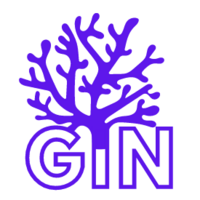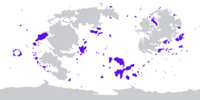Group of Island Nations: Difference between revisions
mNo edit summary |
m (→Leadership) |
||
| Line 118: | Line 118: | ||
* 2022: TBD | * 2022: TBD | ||
* 2024: 50th anniversary | * 2024: 50th anniversary | ||
</div> | |||
==Members== | |||
<div style="column-count:3"> | |||
# {{flag|Andalla}} | |||
# {{flag|Asgeirria}} | |||
# {{flag|Astriedan}} | |||
# {{flag|Ayubi}} | |||
# {{flag|Bainbridge Islands}} | |||
# {{flag|Batengdei}} | |||
# {{flag|Burkini}} | |||
# {{flag|Damak Var}} | |||
# {{flag|Esonice}} | |||
# {{flag|Fjallshima}} | |||
# {{flag|Galahinda}} | |||
# {{flag|Gallambria}} | |||
# {{flag|Giokto}} | |||
# {{flag|Havebergen}} | |||
# {{flag|Kualoa}} | |||
# {{flag|Little Flau}} | |||
# {{flag|Llalta}} | |||
# {{flag|Miiros}} | |||
# {{flag|Niederoestereich}} | |||
# {{flag|Orioni}} | |||
# {{flag|Oyus}} | |||
# {{flag|Pallamara}} | |||
# {{flag|Rohini}} | |||
# {{flag|San Ba}} | |||
# {{flag|Sanctum Imperium Catholicum}} | |||
# {{flag|Selayar}} | |||
# {{flag|Seylos}} | |||
# {{flag|Saint Francoisbourg}} | |||
# {{flag|Sunset Sea Islands}} | |||
# {{flag|Tal Shiar}} | |||
# {{flag|Theaca}} | |||
# {{flag|Vanarambaion}} | |||
# {{flag|Yeosan}} | |||
</div> | </div> | ||
Revision as of 20:21, 17 April 2021
 Logo | |
 Membership (dark blue) of the Group of Island Nations | |
| Abbreviation | GIN |
|---|---|
| Formation | May 19, 1974 |
| Founder | Nakazima Declaration |
| Founded at | Nakazima, Fjallshima |
| Legal status | Active |
| Purpose | Organisations of maritime nations |
| Headquarters | Maimedo (until 2022) |
| Location | |
Region | Eurth |
Secretary General | Mrs Miyo Okage |
| Website | www.gin.org |
The Group of Island Nations (GIN) is a multinational organisation on Eurth. Its members discuss common socio-economical topics challenges as economic development, trade and shipping, ecology, fishing, etc. As island nations, the organisation's members share similar opportunities, concerns and solutions which are markedly different from other, land-based Eurthican countries.[1]
Formation
The 1960s-1970s period on Eurth was a difficult time for many island nations. The Second Argic War had many negative consequences, including rising energy prices and its effect on our shipping costs. The Group of Island Nations expected their combined influence could pressure the Oil Producing Eurthican Countries to again lower these energy prices. The first (informal) meeting took place in 1974 in Fjallshima. It was the first international conference without continental powers. King Tomasso from the Sunset Sea Islands and Michael Cancio from Salvia were there. They, along with a host of other heads of state, put a great megaphone on the islands' situation. They also vowed to no longer get involved in 'Great War' logic. The Nakazima Declaration was an incredibly optimistic moment of fraternity, solidarity and pacifism.[2] This resulted in the Group of Island Nations' formation and the appointment of its first secretary-general.[3]
Leadership
The Group of Island Nations is led by the Secretary-General. This person is appointed to a two-year terms by a simple majority vote of the member countries. The Secretary-General is responsible for organising the conference. Current and previous Secretaries-General include:
- 1974:
 Fjallshima
Fjallshima - 1976:
 Sanctum Imperium Catholicum
Sanctum Imperium Catholicum - 1978:
 Oyus
Oyus - 1980:
 Sunset Sea Islands
Sunset Sea Islands - 1982:
 Orioni
Orioni - 1984:
 Llalta
Llalta - 1986:
 Miiros
Miiros - 1988:
 Seylos
Seylos - 1990:
Gallambria
- 1992:
 Batengdei
Batengdei - 1994:
 Fjallshima
Fjallshima - 1996:
 Sanctum Imperium Catholicum
Sanctum Imperium Catholicum - 1998:
 Orioni
Orioni - 2000:
 Oyus
Oyus - 2002:
 Asgeirria
Asgeirria - 2004:
 Andalla
Andalla - 2006:
 Selayar
Selayar - 2008:
 Yeosan
Yeosan - 2010:
 Pallamara
Pallamara - 2012:
 Llalta
Llalta - 2014:
Gallambria
- 2016:
 Miiros
Miiros - 2018:
 Fjallshima
Fjallshima - 2020:
 Esonice
Esonice - 2022: TBD
- 2024: 50th anniversary
Members
 Andalla
Andalla Asgeirria
Asgeirria Astriedan
Astriedan Ayubi
Ayubi Bainbridge Islands
Bainbridge Islands Batengdei
Batengdei Burkini
Burkini Damak Var
Damak Var Esonice
Esonice Fjallshima
Fjallshima Galahinda
GalahindaGallambria
 Giokto
Giokto Havebergen
Havebergen Kualoa
Kualoa Little Flau
Little Flau Llalta
Llalta Miiros
Miiros Niederoestereich
Niederoestereich Orioni
Orioni Oyus
Oyus Pallamara
Pallamara Rohini
Rohini San Ba
San Ba Sanctum Imperium Catholicum
Sanctum Imperium Catholicum Selayar
Selayar Seylos
Seylos Saint Francoisbourg
Saint Francoisbourg Sunset Sea Islands
Sunset Sea Islands Tal Shiar
Tal Shiar Theaca
Theaca Vanarambaion
Vanarambaion Yeosan
Yeosan
References
- ↑ Group of Island Nations (7 December 2018)
- ↑ Chapter 1: the Nakazima Declaration (8 May 2019)
- ↑ When life gives you lemons, make GIN and tonic (9 March 2019)